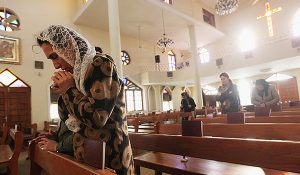Source: National Review Online, http://goo.gl/OKkVmZ
We must prioritize protecting religious minorities under threat.
Earlier this year, the United States Commission on International Religious Freedom (USCIRF) released its 15th annual report on the status of religious freedom around the world. USCIRF’s report reaffirms what we’ve known for years: The plight of religious minorities around the world is troubling, and in many places — such as the Middle East — it is getting worse. Three weeks ago I held a congressional hearing to examine the situation of human rights in Iran and highlight the plight of religious minorities there, despite the false promises of moderation made by Hassan Rouhani.
The fact is that throughout the Middle East, and particularly in Iran, Egypt, Iraq, and Syria, there is widespread persecution of religious minorities, especially Christians. If we want to see a stable and secure Middle East, we must first ensure that the fundamental human rights of all people are being respected, and that includes the right to profess and practice one’s faith freely and openly without fear of persecution. If democracy is ever going to take hold in the region, then the rights of minority communities must be respected. Recent years have proven that elections alone do not make a democracy, and it is equally true that you cannot have a democracy without respect for human rights.
In Iran, one of the world’s worst violators of human rights, the regime systematically discriminates against and persecutes religious minorities. For example, more than 135 members of the Baha’i community — the largest non-Muslim minority in Iran — are currently imprisoned on sham charges, including seven of its leaders. This brutal regime also targets the Christian community — as we were sadly reminded last October, when four Iranian Christians were sentenced to 80 lashes for drinking sacramental wine during communion, and as we are reminded every day by the continued plight of Pastor Saeed Abedini, a U.S. citizen, who has been imprisoned for over a year for practicing his Christian faith.
As part of the Tom Lantos Human Rights Commission’s Defending Freedoms Project, I have chosen to “adopt” Rozita Vaseghi, an Iranian prisoner of conscience, to help call attention not just to her plight, but to that of all religious minorities in Iran. Rozita is a member of Iran’s Baha’i community who has been placed in solitary confinement for at least six months and is denied access to the medical treatment she desperately needs. As the Obama administration continues to negotiate with Iran, this is the perfect time to hold the regime’s feet to the fire and make Iran’s human-rights record, and its support for and backing of terrorism, part of the negotiations.
Meanwhile, in Egypt, Coptic Christians continue to face danger from Muslim Brotherhood members and other extremists, who have attacked hundreds of churches, homes, businesses, schools, and orphanages to kidnap young Christian girls and compel them into forced marriages or make them victims of human trafficking. And in Iraq and Syria, Christians and other minorities are caught in the middle of violent conflicts for political and territorial control.
Because of the resurgence in sectarian violence in Iraq, more than 65,000 Christians have fled to the north, and thousands of others have left the country entirely. This has led to a drastic decline in the number of Iraqi Christians, from over a million before the war to fewer than half a million today. The situation is also dire in Syria, where more than 1,000 Christians were killed in 2013 and public crucifixions are being carried out, according to reports. The danger for Christians and moderate minorities grows as rebels become even more radicalized, as demonstrated earlier this year by the killing of the beloved Father Frans, a Dutch priest who gave refuge to Christians and Muslims in his monastery.
It is not enough to be saddened and shocked by this reality; we must take meaningful action. Our State Department should demonstrate that it takes this issue seriously by designating offending countries, such as Iraq and Syria, as Countries of Particular Concern (CPC). It’s alarming that the State Department has not added any countries to the CPC list for nearly a decade now, despite USCIRF’s continual recommendations that it do so.
At the National Prayer Breakfast in February, President Obama said that promoting religious freedom is a key U.S. foreign-policy objective, and that he looked forward to nominating an ambassador-at-large for religious freedom (which he has yet to do). It is time for the president to back up these words with action and defend this most basic of human rights — not only because it is the correct thing to do, but because this matters to the stability of the region and to our national-security interests.
— Ileana Ros-Lehtinen, a Republican, represents Florida’s 27th congressional district. She is chairman emeritus of the House Foreign Affairs Committee and current chairman of its Middle East and North Africa subcommittee.

Leave a Reply